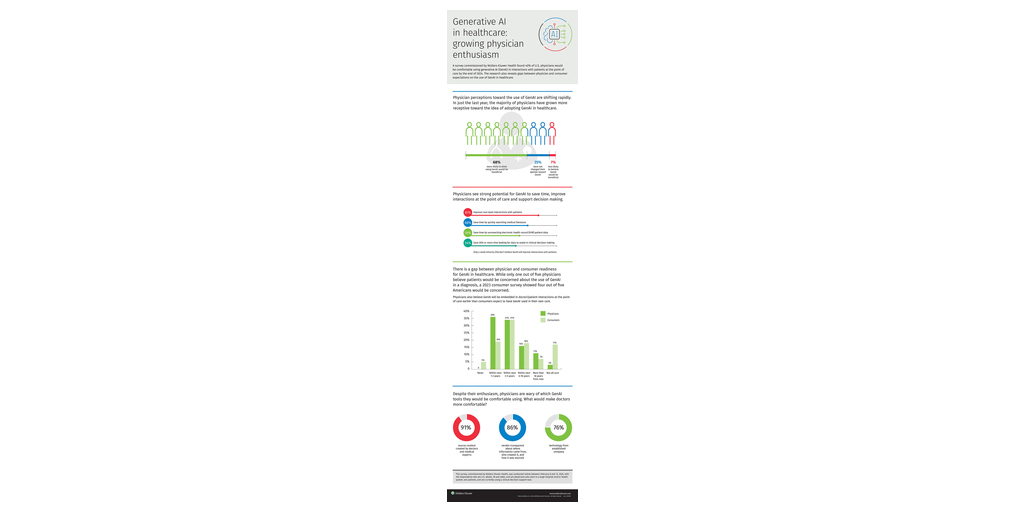Wolters Kluwer Survey: Over Two-Thirds of U.S. Physicians Have Changed Their Mind, Now Viewing GenAI as Beneficial in Healthcare

Forty percent ready to use GenAI this year at point of care but 89% of doctors need content source transparency for confident adoption
WALTHAM, Mass.–(BUSINESS WIRE)–#genai–A new Wolters Kluwer Health survey1 released today finds that 40% of U.S. physicians are ready to use generative AI (GenAI) this year when interacting with patients at the point-of-care. The findings reflect a rapid acceptance of the new technology more broadly, with 68% saying they have changed their views over the last year, and are now more likely to think that GenAI would be beneficial to healthcare.
Physicians, however, are wary of which GenAI tools they would be comfortable using, with 91% of respondents saying they need to know the GenAI sourced materials were created by doctors and medical experts before using it in clinical decisions. Similarly, 89% report they need vendors to be transparent about where information came from, who created it, and how it was sourced.
“Physicians are open to using generative AI in a clinical setting provided that applications are useful and trustworthy,” said Dr. Peter Bonis, Chief Medical Officer, Wolters Kluwer Health. “The source of content and transparency are key considerations.”
Transformative tech: GenAI viewed as helping to save time and optimize care teams
With healthcare facing challenges with staffing shortages and burnout, physicians see many benefits to applying GenAI in the care continuum. When asked how GenAI could support decision making or improve interactions at the point-of-care:
- Four in five (81%) physicians say GenAI will improve care team interaction with patients.
- Over half believe GenAI will save them 20% or more time.
- Over two-thirds (68%) say it can save time by quickly searching medical literature.
- Three in five (59%) say it can save time by summarizing data about patients from the electronic health record (EHR).
- Only 3% do not believe GenAI will improve interactions with patients.
Doctors and patients diverge on GenAI in care
Comparing results of this survey with a Wolters Kluwer survey of U.S. consumers conducted in late 2023 shows that consumers have different views on the integration of GenAI into the physician/patient interaction. Two-thirds of physicians say that patients would be confident in GenAI results to make clinical decisions while just over half of patients report they would be confident. When physicians were asked if they believe patients would be concerned about the use of GenAI in a diagnosis, only one out of five physicians said yes. Conversely, when asked directly, four out of five Americans reported they would be concerned, suggesting a wide gap in perceptions about GenAI readiness among health consumers.
Doctors set high transparency and content source standards for GenAI guidelines
Physicians’ responses reflect a landscape that is still developing clear guidance or policies on using GenAI. Over a third (37%) say there are currently no guidelines in place at their organizations about using GenAI while almost half (46%) say they don’t know of any guidelines.
Still, physicians have concerns about the source of content and want transparency. For the majority of physicians (58%), the number one most important factor when selecting a GenAI tool is knowing the content it is trained on was created by medical professionals.
Nine out 10 (89%) report they would be more likely to use GenAI in clinical decisions if the vendor was transparent about where the information came from, who created it, and how it was resourced. Knowing that the technology is from a well-known, trusted company was also a priority: 76% would be more comfortable using GenAI knowing it came from established vendors in the healthcare sector.
A responsible approach to Clinical GenAI
Wolters Kluwer Health recently expanded the beta of AI Labs, its collaborative solution to explore the experimental use of Clinical GenAI, to 100 U.S. hospitals. AI Labs has access to the complete set of UpToDate® evidence-based clinical content and graded recommendations across more than 25 medical specialties. It is the only large language model (LLM) exclusively powered by UpToDate trusted content. UpToDate is used by more than two million users at more than 44,000 healthcare organizations in over 190 countries. Watch this video to learn more about Wolters Kluwer’s mission for Clinical GenAI.
For more information, download the Generative AI in Healthcare: Growing Physician Enthusiasm Survey Executive Summary
For more information about Wolters Kluwer, please visit: www.wolterskluwer.com
1 This survey, commissioned by Wolters Kluwer Health, was conducted online between February 8 and 13, 2024, with 100 respondents who are U.S. adults, 18 and older, and are physicians who work in a large hospital and/or health system, see patients, and are currently using a clinical decision support tool.
About Wolters Kluwer
Wolters Kluwer (EURONEXT: WKL) is a global leader in information, software solutions and services for professionals in healthcare; tax and accounting; financial and corporate compliance; legal and regulatory; corporate performance and ESG. We help our customers make critical decisions every day by providing expert solutions that combine deep domain knowledge with technology and services.
Wolters Kluwer reported 2023 annual revenues of €5.6 billion. The group serves customers in over 180 countries, maintains operations in over 40 countries, and employs approximately 21,400 people worldwide. The company is headquartered in Alphen aan den Rijn, the Netherlands.
For more information, visit www.wolterskluwer.com, follow us on LinkedIn, Facebook, YouTube and Instagram.
Contacts
Media
André Rebelo
Director, External Communications
Wolters Kluwer Health
+1 (781) 392-2411
andre.rebelo@wolterskluwer.com




